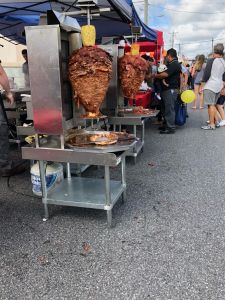Editor’s Note: This first appeared on the Cabrini University Blog
Cinco de Mayo, held annually on May 5, is a time to celebrate for Mexicans. However, Americans have commercialized Cinco de Mayo and use it as an opportunity to drink and eat Mexican food. It’s so much more than that to Mexicans.
Many Americans believe that Cinco de Mayo is Mexico’s Independence Day, but that couldn’t be further from the truth.
History of Cinco de Mayo
In 1862, the outnumbered Mexican army defeated France at the Battle of Puebla during the French-Mexican War, 1861–1867). The Battle of Puebla was part of the “second French intervention in Mexico.” After the Mexican army defeated French troops, the French retreated, which represented a moral victory for the people of Mexico. The battle symbolized Mexico’s ability to defend its sovereignty against a powerful foreign nation.
Cinco de Mayo in the United States

A year after the battle was the first time the United States celebrated Cinco de Mayo to show solidarity. As the years went by, the holiday was seen as an opportunity to celebrate Mexican culture. It wasn’t until the 1980s when Cinco de Mayo became commercialized by alcohol companies. Some companies used the holiday as an advantage to get more money and consumers. Many Americans believe that Cinco de Mayo is Mexico’s Independence Day, but their Independence Day is Sept. 16.
Only major cities like San Diego, California, and Portland, Oregon, celebrate Cinco de Mayo by staying true to the holiday’s roots and holding large multicultural fiestas. They do this by hosting historical and cultural performances. Mariachis play and dancers perform traditional Mexican Bailes (dances). These festivals aren’t just for historical events in Mexico’s history, but they are days where everyone comes together as a community to celebrate their culture.
Cinco de Mayo in Mexico
Mexico does celebrate Cinco de Mayo. However, they celebrate it in a low-key manner. Only some cities, like the city of Puebla, have parades and fiestas that start at 10 a.m. and lasts for hours. The parade begins with a reenactment of the battle, where people are dressed up as Mexican and French soldiers. The parade also features more than 10,000 community members and performers on colorful floats wearing elaborate costumes.
Other Important Mexican Holidays

The three other holidays that are important to Mexicans are Día de la Bandera (Flag Day), Día de la Independencia (Independence Day), and Día de los Muertos (Day of the Dead).
Día de la Bandera is a day where Mexicans celebrate the country’s flag with parades and fiestas. Día de la Independencia, Sept. 15-16, is when they celebrate their independence. The celebration begins on Sept. 15, right before midnight.
In Mexico, Independence Day is also known as “Grito de Dolores,” which translates to “Cry of Dolores.” Every year, Mexico’s president stands on the National Palace balcony to deliver a speech. The president’s speech always ends with the words “¡Viva Mexico!” On the next day, in downtown Mexico City, a military parade takes place. During the two days, most people celebrate on the streets while also enjoying traditional food like pozole, which is a type of soup.

Día de los Muertos takes place on Nov. 1-2. It’s important to know that Day of the Dead is not Mexico’s Halloween. Day of the Dead is a holiday that celebrates family members that have passed away. Many believe that the dead are awakened from their eternal sleep on this day and join their loved ones to celebrate. One could make a shrine or altar and decorate it with photos of their family members and candles to celebrate. Mexicans also leave food so that the dead can come back for one night to enjoy their favorite food.


